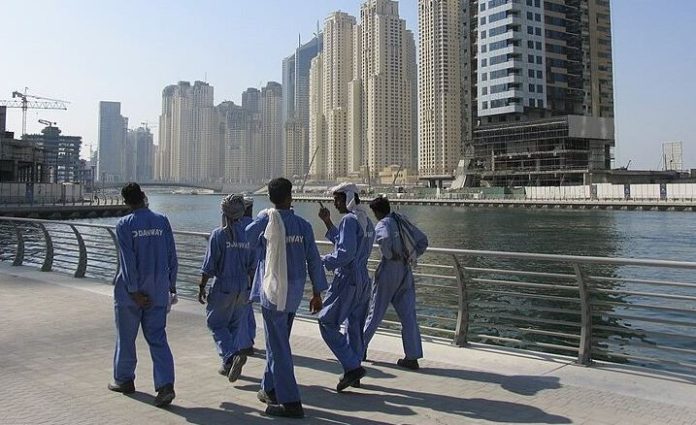The United Arab Emirates – host nation of last year’s COP28 climate summit – has become the first country to submit a climate action plan to the United Nations under the latest round of updates, setting an emissions reduction target for 2035.
In its third Nationally Determined Contribution (NDC), the oil and gas-rich Gulf state said it will aim to reduce emissions by 47% between 2019 and 2035 on its way to reaching net zero by 2050.
Flourish logoA Flourish chart
The plan says that the UAE “recognises the urgency of the climate crisis” and its new NDC is “paving the way to ensure 1.5C remains within reach”.
It plans to cut emissions through measures like installing solar and nuclear power, investing in carbon capture and storage and carbon dioxide removal technologies, and producing oil and gas in a less polluting way.
As called for by the UN’s climate chief Simon Stiell last month, the target includes all greenhouse gases and all sectors of the economy.
Climate campaigners criticised the UAE, however, for failing to include any measures to restrain the production of oil and gas, which is projected to rise by a third by 2035. Under UN carbon accounting rules, the emissions from the consumption of the UAE’s oil and gas abroad are not counted towards its own emissions.
While the UAE aims for a 47% cut, climate scientists working with the Intergovernmental Panel on Climate Change say that global emissions need to fall 60% between 2019 and 2035. But countries are expected to move at different paces towards that target depending on their levels of development.
In its new NDC, the UAE says that its 2035 emission reduction target “balances ambition with fairness, ensuring that its contributions are significant but achievable given its national circumstances”.
The UAE’s previous NDC contained a target to reduce emissions 19% by 2030. But Climate Action Tracker has said that, based on its current policies, emissions instead look set to rise by about 16-20% by the end of the decade.
Fresh round of NDCs
All the 194 countries that signed up to the Paris climate agreement are supposed to submit a more ambitious NDC every five years.
The first set was produced just after the Paris accord was signed in 2015, the second came in around the COP26 climate summit in 2020 and this third iteration is supposed to be published by February next year.
The UAE is the first country to publish a new NDC in this round. A few others – particularly those of the COP29 host country Azerbaijan and the COP30 host Brazil – are expected to be announced at COP29 or by the end of the year.
US election: Climate experts react to Donald Trump’s victory
All three governments, known as the “Troika”, have promised that their targets will be aligned with the strongest Paris Agreement goal to limit global warming to 1.5C. But, as Brazilian climate negotiator Liliam Chagas said in June, “there is no multilaterally agreed methodology” on what that means in practice. “It’s up to each one to decide,” she said.
While it has not been agreed between governments, the Climate Action Tracker project has a methodology for judging what level of global warming individual NDCs are compatible with.
It found that no NDC in the second round was compatible with the 1.5C limit and only a handful – including the UAE’s – were compatible with keeping the rise in global temperatures below 2C. It has yet to judge the UAE’s latest NDC.
Calls to end fossil fuel expansion
E3G analyst Steffen Menzel praised the UAE for keeping its promise to publish an early NDC. But, he said, the “ambition level and determination towards decarbonisation is debatable and needs further scrutiny”.
“Promoting further fossil fuel expansion cannot be ‘1.5-aligned’,” he added – a sentiment widely shared by other campaigners.
Emerging economies set up COP29 agenda fight over trade measures
Shady Khalil, Oil Change International strategist, said the UAE’s NDC ignores the “urgent need to immediately halt fossil fuel expansion everywhere”. Greenpeace Middle East and North Africa campaigner Hanen Keskes said the UAE’s wealth and influence give it a unique opportunity to be the first major oil and gas producer “to take the bold step of halting fossil fuel expansion”.
The International Energy Agency has said that new projects to expand fossil fuel production are not compatible with the 1.5C warming limit.
Under UN carbon accounting rules, emissions are counted where they are released into the atmosphere. A barrel of oil produced in the UAE but burned in a power station in the US is counted towards the US’s emissions.
Climate Action Tracker researcher Niklas Höhne told a webinar on Thursday that the emissions from the UAE’s fossil fuel exports are three times as high as the country’s domestic emissions.
Because of these accounting rules, the vast majority of NDCs do not include plans to restrain fossil fuel production. On the same webinar, Climate Home asked Selwin Hart, climate adviser to the UN Secretary-General António Guterres, whether they should.
Selwin Hart, special adviser to the UN secretary-general on climate action (Photo: Juan Manuel Herrera/OAS/OEA/Flickr)
He replied that he “would love to see all of the NDCs address both production and consumption of fossil fuels” – but they are “nationally determined documents”, so “countries can decide what they wish to include”.
Speaking after him, E3G analyst Alden Meyer said he could be “a little more blunt than someone is able to be in [Hart’s] diplomatic position”. “If a country wants to be viewed as 1.5C-aligned and it’s a major producer and exporter of fossil fuels, it has to show how it’s going to address both the supply and demand side there and have a credible transition strategy,” Meyer said.
Andreas Sieber, associate policy and campaigns director at 350.org, told Climate Home he expected Colombia and perhaps the UK to include halting of oil and gas expansion in their new NDCs.
Oil Change’s Khalil called for COP Troika nations Brazil and Azerbaijan to “step up”. “If they want to be climate champions, they must call for a halt on fossil fuel expansion,” he said.
(Reporting by Joe Lo; editing by Megan Rowling)

















